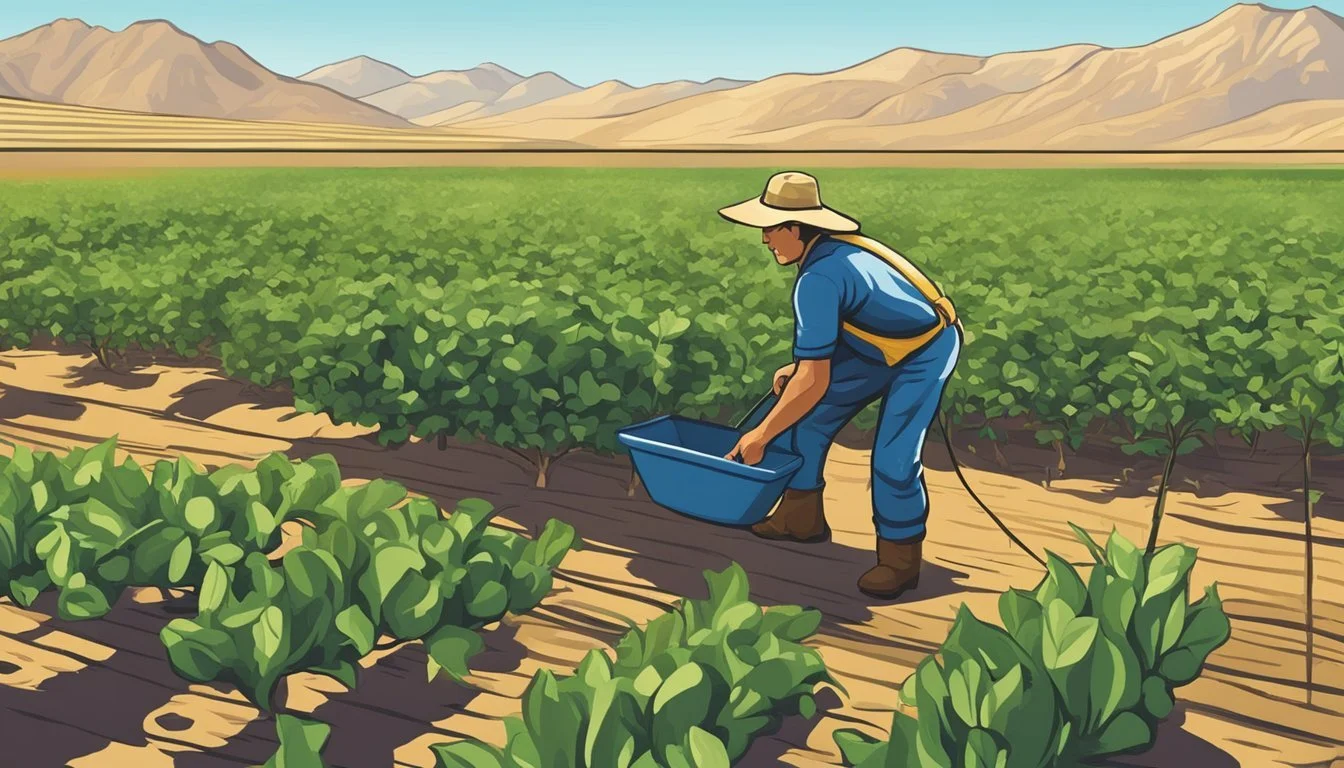Right to Farm Law in Nevada
Understanding Agricultural Protections and Limitations
The Right to Farm laws in Nevada are designed to protect agricultural operations from nuisance lawsuits that may arise as new residents move closer to established farming areas. These statutes support the continuity and viability of agricultural activities by affirming the rights of farmers to conduct their business without facing undue legal challenges. Nevada's approach to its Right to Farm laws emphasizes the balance between agricultural activity and compliance with existing federal, state, and local laws.
Nevada's Right to Farm laws specifically require that agricultural practices do not violate any laws or regulations, hence the protected operations must use good agricultural practices. This is a critical consideration aimed at harmonizing farming operations with environmental and public health standards. The legal framework within Nevada serves as a backbone to the state's agricultural economy by providing a degree of certainty and protection for farmers and ranchers engaging in legitimate farming practices.
In essence, these laws are an acknowledgment of the importance of agriculture to Nevada's economy and culture. The statutes function to discourage conflicts between agricultural and non-agricultural land uses, while encouraging mutually beneficial coexistence. By putting such legislation in place, Nevada joins other states in a nationwide effort to sustain agricultural operations and mitigate the potential for litigation that can arise from the urbanization of rural areas.
Overview of Right to Farm Laws
Nevada’s Right to Farm laws are designed to support the agriculture industry by safeguarding farming operations from nuisance lawsuits, balancing interests related to public health and safety in rural areas.
Historical Context
In Nevada, the Right to Farm statute originated as a state response to mitigate conflicts between agricultural operations and neighboring landowners. They are part of a broader national trend as all fifty states have enacted similar laws. These laws recognize farming as a critical component of the state's economy and food production system.
Purpose and Intent
The primary aim of Nevada's Right to Farm laws is to protect agricultural activities deemed essential to the state and its residents. They ensure that farmers can operate without the undue burden of nuisance lawsuits from neighbors who may be inconvenienced by the ordinary operations of farming, such as noise, odors, or dust.
Key Principles
Right to Farm laws in Nevada operate under several key principles:
Qualifying Farmers: The laws protect established farms from nuisance claims, particularly when the farms predate surrounding non-agricultural developments.
Rural and Urban Balance: They attempt to balance the needs and interests of agricultural operations with those of neighboring urban or suburban developments.
Public Health and Safety: There is a clear delineation that the protection does not extend to practices that harm public health or safety, emphasizing responsible farming practices.
Right to Farm Law in Nevada
Nevada recognizes the importance of agriculture to its economy and lifestyle, leading to the establishment of the Right to Farm Law. This legislation is designed to protect agricultural operations from nuisance lawsuits while promoting good agricultural practices.
Specific Provisions
The Nevada Revised Statutes, specifically NRS 40.140, outlines the legal framework that designates agricultural activities on farmland as permissible and not to be considered a nuisance, provided they comply with all applicable laws. It emphasizes the right of farmers and ranchers to engage in typical agricultural activities without fear of undue litigation costs, so long as these activities do not infringe upon federal, state, or local laws.
Protected Farming Operations
Farm operations in Nevada are safeguarded under the Right to Farm provisions provided they employ good agricultural practices. These include a range of activities such as cultivation, harvesting, and processing. Farming operations benefit from this protection as it helps to ensure that common agricultural impacts, such as odor or noise, are not grounds for nuisance lawsuits, thus supporting Nevada’s agricultural businesses and livelihoods.
Limitations and Exceptions
Although the Right to Farm Law offers extensive protection, there are certain limitations. Operations must not violate any existing laws, and the protections granted by the statute do not extend to actions that are considered negligent or improper. Moreover, the law delineates that farming practices which were not established prior to surrounding non-agricultural activities may not be granted the same level of protection, acknowledging the potential for conflict between agricultural and residential land uses.
Legal Framework and Challenges
This section delves into the intricate balance of federal and state jurisdiction within Nevada's Right to Farm laws, noteworthy litigation and legal precedents, and the interaction between state statutes and local ordinances.
Federal vs. State Jurisdiction
Federal laws set the baseline for agricultural practices, but Nevada's Right to Farm statute operates within this framework to offer additional protections. The state law safeguards agricultural activities on farmland, provided they conform to existing laws at all levels. Attorneys may need to navigate the complex interplay between federal directives and state-specific interpretations when advising farmers or representing them in disputes.
Federal Jurisdiction State Jurisdiction Clean Air Act Nevada Revised Statutes Clean Water Act Nevada Right to Farm Act
Litigation and Legal Precedents
Legal challenges have tested the boundaries and definitions within Nevada's Right to Farm law. Litigation costs can be prohibitive, pushing parties towards settlement. Noteworthy legal precedents often pivot on what constitutes "good agricultural practices," and whether alleged nuisances are, in fact, legitimate grievances or protected farming operations.
Key Precedents:
The definition of a nuisance in relation to farming practices.
The application of Right to Farm protections in cases of expansion or change in use.
Role of Local Ordinances
Local laws play a critical role in how state Right to Farm statutes are implemented on the ground. While state laws protect farmers, they must operate in harmony with local ordinances. These local regulations can sometimes restrict farming operations more than state law, leading to legal disputes that hinge on the prioritization of competing legal frameworks.
Considerations:
Zoning requirements
Noise and odor ordinances
Impact and Effectiveness
The Right to Farm Law in Nevada has influenced multiple facets of agricultural dynamics, encompassing economic outcomes, environmental health, and community relations.
Economic Impacts on Agriculture
Nevada's Right to Farm law has been associated with a 26 percent increase in the number of farms since its enactment in 1985. However, the amount of land dedicated to farming has decreased by 31 percent in the same timeframe. The law may contribute to economic resilience for existing farms, as it shields them from nuisance lawsuits, potentially averting the financial burdens of litigation. Nonetheless, the consolidation of farmland suggests a shift towards potentially fewer but larger agricultural enterprises.
Farmland: Decrease in acres available for farming
Economic Outcomes: Protection from nuisance lawsuits encourages investment and continuation of farming operations
Environmental Considerations
While Right to Farm laws like those in Nevada are designed to protect agricultural activity, they prompt a complex dialogue on environmental stewardship and soil health. Critics argue that these laws can create loopholes allowing for insufficient regulation of pollution from agriculture, consequently impacting environmental justice.
Soil Health: Potential risks if environmental regulations are under-enforced
Environmental Justice: Concerns about the intersection of agriculture, justice, and sustainability
Community Relations
The intention behind Right to Farm statutes is often to preserve the traditional practices of rural life, particularly in relation to farming. However, as rural areas grow and more people without ties to agriculture move in, tensions can arise. These laws can be pivotal in maintaining harmonious community relations by protecting farmers, but they might also contribute to divisions if not coupled with efforts to educate new residents about the realities of agricultural life.
New Residents: Education and communication are key to avoiding disputes over farming practices
Long-standing Operations: Laws support the continuation of traditional farming despite changes in community demographics
Comprehensive Analysis and Resources
This section provides detailed insights into the Right to Farm Law in Nevada, drawing from authoritative resources that offer both national perspective and state-specific legislation. It ensures that practitioners and researchers have access to the most current and relevant legal information.
National Agricultural Law Center
The National Agricultural Law Center serves as a principal source for legal research publication on agricultural laws including Right to Farm. It offers a compilation of resources and a variety of research publications. One can find specific details and a chart that outlines Right to Farm laws across different states, updated regularly by experienced legal researchers. Access to these resources is free, providing invaluable assistance to both legal professionals and the public.
State-Specific Right to Farm Laws
Nevada's Right to Farm statute is codified in Nev. Rev. Stat. § 40.140. The state-specific law mandates that agricultural activities on farmland must adhere to good agricultural practices without violating any federal, state, or local laws. This statute is designed to protect agricultural operations while ensuring they follow legal standards. For those requiring more in-depth analysis, state-specific details are accessible through various legal directories and agricultural law resources.
Ongoing Legal Developments
Ongoing legal developments in Right to Farm laws are significant, as they can influence both current and future agricultural practices. Researchers and the director of state agriculture departments keep a keen eye on updates to ensure compliance and inform stakeholders. Legal challenges and rulings at the state level can set precedents that affect Right to Farm statuses. Monitoring these legal developments is crucial for anyone involved in agriculture, law, or rural advocacy.
Future of Farming and Legal Protections
In Nevada, the Right to Farm laws are foundational to ensuring the security and sustainability of agriculture for the future. As Nevada reconciles the growth of urban areas with traditional farming communities, these legal protections become increasingly important.
Provisions under Nevada Law
Nevada statute safeguards agricultural activities on farmland, provided they adhere to all layers of legislation - federal, state, or local. The law mandates that operations engage in good agricultural practices:
Compliance: Must align with existing laws and regulations.
Preservation: Designed to shield qualifying farmers from nuisance lawsuits.
Federal Law Considerations
While statutory schemes ensure state protections, they are also subject to federal law. However, no direct expiration of these protections has been legislatively noted, which signals continued support for farmers.
Support for Qualifying Farmers
Qualifying farmers receive essential backing through these statues. They are shielded from the potential friction that may arise from new residential developments encroaching upon rural land traditionally used for agriculture.
Legal Assurance
The assurance provided by Right to Farm laws holds particular significance in an era where agriculture faces various challenges, from labor requirements to adjusting to technological advancements. The statutory schemes reflect a commitment to the following aspects:
Durability: The laws are designed to withstand changes over time.
Flexibility: Amendments can strengthen protections as necessary.
The intersection of evolving legal frameworks and agricultural needs places Nevada at the heart of a transformative era for farming. The state's commitment to legal protections for agriculture signals a clear pathway forward in supporting the industry's future viability.
State Comparative Summaries
Right-to-Farm laws are designed to protect agricultural operations from nuisance lawsuits, with statutes varying significantly from state to state. These laws establish a legal framework that balances the rights of farmers with those of their neighbors and community members. The following summaries provide an overview of how Right to Farm Laws manifest across different states for comparative insight.
Arizona
In Arizona, Right-to-Farm protections limit nuisance actions against farming operations, provided they comply with state statutes and regulations. Agricultural activities in existence for more than one year are generally protected, unless they have undergone a substantial change.
Florida
Florida's Right-to-Farm Act provides strong protections for farmers by restricting nuisance suits if the farm operation is not negligent and has been in existence for a year or more. The state emphasizes that farm operations should follow generally accepted agricultural and management practices.
Georgia
Georgia law defends farmers by prohibiting nuisance suits against agricultural facilities that have been operational for at least a year. The law dictates that changes in ownership or size do not waive these protections, ensuring long-term stability for farmers.
Maine
Maine's Right-to-Farm laws affirm that farming activities and operations cannot be deemed a nuisance if they are in legal compliance and established prior to surrounding non-agricultural activities. The state underscores the significance of farming to Maine's economy and rural heritage.
North Carolina
North Carolina protects farm operations from nuisance claims through their Right-to-Farm statute, applying to operations that have existed for more than a year. The law also guards against ordinances that would make changes in rural areas which could restrict or regulate farms in an unreasonable manner.







